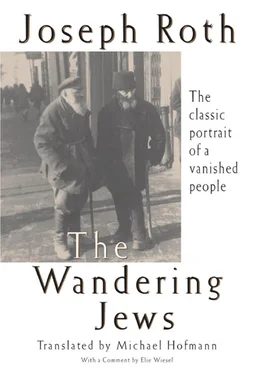“National self-determination” was the battle cry all over Europe, and the Jews took it up as well. The Treaty of Versailles and the League of Nations did all they could to ensure the Jews’ right to nationhood. Today the Jews constitute a “national minority” in many countries. They don’t have everything they want, but they have a lot: their own schools, the right to their own language, and several other rights of the sort that are supposed to confer happiness in Europe.
But even if the Jews were to succeed in acquiring all the rights of a “national minority” in Poland, in Czechoslovakia, in Romania, in the German-speaking part of Austria, it would still beg the great question of whether the Jews are not actually a far bigger thing altogether than a European-style national minority; whether they are not indeed more than a “nation” in the European sense; and whether, in pressing their entitlement to “national rights,” they are not renouncing far more important claims.
What bliss to become a “nation,” no different from the Germans, the French, or the Italians, having already been a “nation” themselves for over three thousand years and fought “holy wars” and experienced periods of greatness! Having beheaded enemy generals and overcome one’s own. The era of “national history” and “patriotic studies” lies way back in the Jewish past. Jews patrolled and defended their own borders; conquered cities; crowned kings; paid taxes; were subjects; had “enemies”; were taken prisoner; dabbled in global politics; brought down cabinet ministers; had a kind of university, with professors and students; a stuck-up caste of priests, wealth and poverty, prostitution, ownership and penury, masters and slaves. Do they want all that again? Can it be that they’re envious of European states?
Certainly they want more than merely to safeguard their “national characteristics.” They want their rights to life, health, and liberty, rights that in almost every European country they are denied outright or have only in curtailed form. Truly Palestine is witnessing a national rebirth. The young halutzim are brave farmers and workers, and they demonstrate the willingness of the Jew to work and till the fields and become sons of the soil, in spite of having spent hundreds of years among books. Unfortunately the halutzim are also obliged to take up arms, to be soldiers, and to protect the land against the Arabs. Thus the European example has been carried into Palestine. Unfortunately, the young halutz is not only a returnee to the land of his forefathers and a proletarian with the righteous outlook of a workingman; he is also the disseminator of a culture. He is as much a European as he is a Jew. He brings the Arabs electricity, fountain pens, engineers, machine guns, shallow philosophies, and all the other things that come out of England. Of course the Arabs ought to be grateful for the fine new roads. But the instincts of a people close to nature quite rightly rebel against the onslaught of an Anglo-American civilization, all in the honorable name of national rebirth. The Jew has a right to Palestine, not because he once came from there but because no other country will have him. The Arab’s fear for his freedom is just as easy to understand as the Jew’s genuine intention to play fair by his neighbor. And despite all that, the immigration of young Jews into Palestine increasingly suggests a kind of Jewish Crusade, because, unfortunately, they also shoot.
Even if the Jews reject Europe’s bad habits and customs, they aren’t quite able to do without them. They are themselves Europeans. The Jewish governor of Palestine is beyond question an Englishman. He’s probably even an Englishman first and Jew second. The Jews are either victims or helpless tools of European politics. They are exploited or abused. At any rate it will be difficult for them to become a nation with a completely new, un-European physiognomy. The European mark of Cain won’t wash off. It is surely better to be a nation than to be maltreated by one. But it’s a painful necessity all the same. Where’s the pride for the Jew, who disarmed long ago, in proving once more that he is capable of squad drill!
Because actually the world isn’t made up of “nations” and fatherlands, that want only to preserve their cultural distinctions, and only if it means not sacrificing a single human life. Fatherlands and nations want much more, or much less: They have vested interests that insist on sacrifices. They set up a series of “fronts” in order to secure the “hinterland” that is their real objective. Given all the millennial grief of the Jews, they still had one consolation: the fact that they didn’t have such a fatherland. If there can ever be such a thing as a just history, surely the Jews will be given great credit for holding on to their common sense in not having had a fatherland at a time when the whole world launched itself into patriotic madness.
They have no fatherland, the Jews, but every country in which they live and pay their taxes looks to them for patriotic commitment and heroism, and reproaches them for dying without enthusiasm. In these circumstances Zionism is really the only way out: If one must be patriotic, then at least let it be for a country of one’s own.
But for as long as Jews continue to live in the countries of others, they are required to live and, unfortunately, also to die for these countries. Yes, there are even some Jews who live and die for these countries with enthusiasm. There are Eastern Jews who have assimilated to the country of their choice, and have completely adopted the local set of values, including “fatherland,” “duty,” “a hero’s death,” and “war loans.”They have become Western Jews, Western Europeans.
But what makes a “Western Jew”? Is it that he can prove that his ancestors were fortunate enough never to have had to flee from any Western European, not to say German, pogroms, in the Middle Ages or subsequently? Is a Jew from the city of Breslau, long known by its Polish name of Wroclaw, more of a Western Jew than one from Cracow, which is still in Poland today? Is a man a Western Jew if his father has no memories of Posen or Lvov? Almost all Jews were Western before they ever got to Russia or Poland. And all Jews were once “Eastern Jews,” before a few of them went West. Half of all the Jews who today speak contemptuously or disparagingly of the East had grandfathers who came from Tarnopol.‡ And if they weren’t, then it was by sheer, blind fortune. How easy in the course of a pogrom to end up suddenly in the East, where they hadn’t yet begun beating their Jews!
All that makes it unfair to assert that a Jew who came to Germany from the East in 1914 had any lesser understanding of war loans or draft boards than a Jew whose ancestors had lent money or been drafted for the past three hundred years. The more imbecilic the immigrant, the sooner he bought war bonds. Many Jews, Eastern Jews, or the sons and grandsons of Eastern Jews died in the War fighting for one or other of the countries of Europe. I don’t say this to exonerate the Eastern Jews. On the contrary: I blame them for it .
They died, suffered, caught typhoid, supplied “spiritual counselors” for the field, even though Jews are allowed to die without a rabbi and stand in even less need of some padre’s patriotic rhetoric than their Christian fellows. They fell in with Western abuses and bad habits. They assimilated. They no longer pray in synagogues and prayerhouses, but in boring temples where the worship is as mechanical as it is in the better class of Protestant church. They came to be temple Jews, in other words: well-bred, clean-shaven gentlemen in morning coats and top hats, who wrap their prayer book in the editorial page of the Jewish newspaper in the belief that it will attract less attention that way. Organ sounds are heard in the temple, and the cantor and rabbi wear headgear that might have been borrowed from a Christian minister. Any Protestant blundering into a Jewish temple would have to admit that the difference between Jew and Christian is not that great, and he might even give up his anti-Semitism if it wasn’t that he had such keen business competition from the Jews.
Читать дальше












